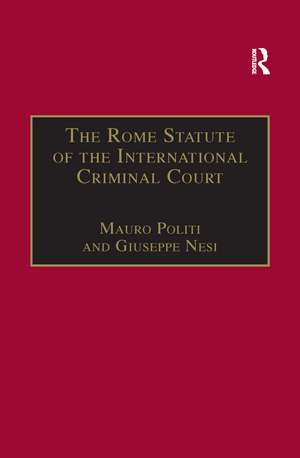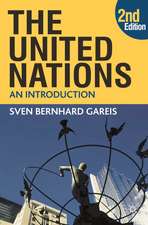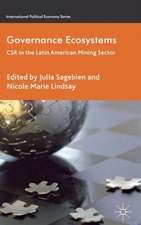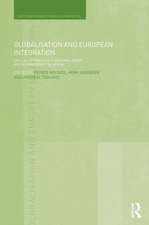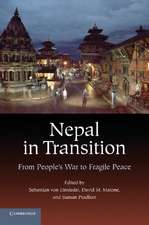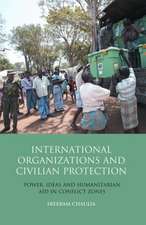The Rome Statute of the International Criminal Court: A Challenge to Impunity
Autor Mauro Politi, Giuseppe Nesien Limba Engleză Paperback – 11 noi 2016
| Toate formatele și edițiile | Preț | Express |
|---|---|---|
| Paperback (1) | 338.33 lei 6-8 săpt. | |
| Taylor & Francis – 11 noi 2016 | 338.33 lei 6-8 săpt. | |
| Hardback (1) | 770.62 lei 6-8 săpt. | |
| Taylor & Francis – 18 mai 2001 | 770.62 lei 6-8 săpt. |
Preț: 338.33 lei
Preț vechi: 386.77 lei
-13% Nou
Puncte Express: 507
Preț estimativ în valută:
64.74€ • 66.79$ • 54.03£
64.74€ • 66.79$ • 54.03£
Carte tipărită la comandă
Livrare economică 26 martie-09 aprilie
Preluare comenzi: 021 569.72.76
Specificații
ISBN-13: 9781138257108
ISBN-10: 1138257109
Pagini: 342
Dimensiuni: 148 x 210 mm
Greutate: 0.45 kg
Ediția:1
Editura: Taylor & Francis
Colecția Routledge
Locul publicării:Oxford, United Kingdom
ISBN-10: 1138257109
Pagini: 342
Dimensiuni: 148 x 210 mm
Greutate: 0.45 kg
Ediția:1
Editura: Taylor & Francis
Colecția Routledge
Locul publicării:Oxford, United Kingdom
Cuprins
Contents: The International Criminal Court: Its Main Features: Some reflections on the Rome conference, Giovanni Conso; The Rome statute of the ICC: rays of light and some shadows, Mauro Politi; The experience of the preparatory committee, Adriaan Bos; The international criminal court in perspective: from the Rome conference to the years to come, John T. Holmes; International criminal court: the role of the security council, Elizabeth Wilmshurst; The role of the security council and the independence of the international criminal court: some reflections, Nabil Elaraby; The Rome statute of the international criminal court: expectations of the jurisdiction, Mahnoush H. Arsanjani; The role of the prosecutor, Silvia A. Fernandez De Gurmendi; The international criminal court: jurisdiction, trigger mechanism and relationship to national jurisdictions, Hans-Peter Kaul. The International Criminal Court and the International Protection of Human Rights: Introductory remarks, Theodor Meron; The Rome statute of the international criminal court and human rights, Fausto Pocar; Crimes against humanity and the Rome statute of the international criminal court, Roger S. Clark; War crimes in international armed conflicts, Gabriella Venturini; War crimes and internal conflicts in the statute of the international criminal court, Luigi Condorelli; The protection of children’s rights in the statute of the international criminal court, John T. Holmes; The status of the individual in the statute of the international criminal court, Lamia Mekhemar; State’s crime and individuals’ crimes: what relationship?, Giorgio Conetti. The International Criminal Justice System After the Rome Conference: The preventive and the repressive function of the international criminal court, Otto Triffterer; The international criminal court and national jurisdictions, Flavia Lattanzi; Follow up to Rome: preparing for entry into force of the statute of the international criminal court, William A. Schabas; Curr
Recenzii
'...it represents, in a concise and convenient format, the contemporaneous thinking of some key participants and observers of the 1998 Rome Conference.' The Law and Politics Book Review 'The book is easily accessible through its clear and systematic structure of the different papers...the book is unique in the sense that it has been written by those who have been directly involved with the implementation of the ICC, and it is a very pragmatic approach to the underlying problems of the Statute. In sum, the book provides the reader with a lot of factual information about the preparation phase and the Rome conference, and it also contains a wealth of critical ideas.' German Yearbook of International Law ’...a useful collection of short analyses of topics related to the ICC.’ Netherlands International Law Review '...a good book for the identification of the character of the system of international criminal law within the law of the ICC.' Contemporary Journal of International Criminal Law
Descriere
This book focuses on the Statute of the International Criminal Court, gathering contributions by leading scholars and diplomats.
